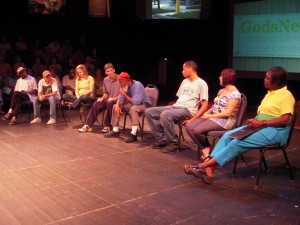Review: Please Don’t Call Me Homeless: I Don’t Call You Homed
By Mary Alice Pratt
The Downtown Arts Center was sold out for both the August 20 and 21 performances of Please Don’t Call Me Homeless: I Don’t Call You Homed. On both evenings an enthusiastic audience, eager for personal interactions, thronged the actors as they emerged after the play. The actors were individuals who had experienced homelessness often due to addictive diseases and who were now enjoying new lives of sobriety, hope, and dignity. They were also clients of the Catholic Action Center (CAC), which has worked with persons on the margin for 10 years.
Eric Seale, Artistic Director of Actors Guild of Lexington, deserves much credit for having guided the actors as they portrayed their own lives. Jeff Gross deserves no less credit for producing the script of the performers’ own words about their experiences. Gross became involved with persons at the CAC while working there as a volunteer. A UK graduate student in English, he spent several months listening to individual stories before incorporating them into a script.
Actors in the play were all participants in the CAC’s “Circle of Care.” As the play program describes it, the Circle of Care includes “weekly meetings of community mentors and participants to give care, connection and accountability needed by those walking the journey from the streets to a home.”
The Circle of Care is part of the CAC’s From the Streets to a Home program developed in 2009. At that time and in partnership with the Lexington Housing Authority and Kentucky Housing Corporation, “the Catholic Action Center became a volunteer provider of services for the Shelter Plus Care HUD Program. The federal program pays the rent and utilities for chronically homeless men and women who have been struggling with mental illness, addictions or HIV/AIDS. The goal is to end chronic homelessness and give individuals the opportunity to live in dignity with continued support and accountability.”
Alternating between past experiences on the streets and present day scenes of support in Circle of Care meetings, Please Don’t Call Me Homeless depicts the journey of several of these individuals. The opening scene shows them waking up in shelters, abandoned houses, on park benches, or under bridges. Immediately the audience learns the strenuous circumstances of living without a home. It is necessary to get up very early so as not to be accused of trespassing, to find possible work for the day, or to avoid being arrested for vagrancy. To protect their meager belongings—sleeping bags, extra clothes, or other personal items—which they do not want to carry all day, each had secret hiding places.
Each actor reveals bits of his or her experience of distress. Actor and Streets to Home participant Ellis Boatley lost his job, got involved with drug users and traffickers, “chose to be homeless,” and ended up sleeping in abandoned houses. In one Circle of Care scene, Boatley tells the support group, “I didn’t consider it breaking in, and I didn’t want to make a mess or cause any trouble. I just wanted to be warm enough and dry and safe.”
In the play, getting through the day provides a variety of challenges for all the characters: getting something to eat, keeping clean, obtaining the substances they “needed.” Joe Shuman tells of how he collected enough aluminum cans each day to buy a six pack of beer. Toni Hargis mourns the loss of custody of her daughter because of drug addiction. Hargis shares how she would rest at the Salvation Army between her episodes of drug taking because it was too hard to get enough sleep on the streets: “I just wanted to get high. That’s what my day was all about.”
Other actors shared their experiences and insights as well. Binta Baraka, dubbed “Queen” by her brother, tells of men bringing her into their homes and waking up “with a guy standing over me, and I knew I was in trouble.” Eric Ogle, age 26, was thrown out of his sister’s house. Ben “The Professor” Bond, who sometimes stayed in The Hope Center, points out, “In the shelter you have to live under their schedule and by their rules.”
In the final counseling scene, the actors plead, “Please don’t call me homeless.” They are not homeless because they are cared about, by each other and by volunteers in the community. They belong. They radiate hope. They do not want to be labeled “homeless” because they are multi-dimensional human beings with hopes, dreams, families, skills, and dignity. As Hargis says, “Please don’t call me homeless because home is where my family is,” referring to the Circle of Care community. “And as long as I have a family who loves me, I’ll always have a home.”
Please Don’t Call Me Homeless has given something to the community. These actors have shown us the human face of homelessness by sharing their lives through their performances. Also, importantly, they have shown us hope. Regardless of how desperate life becomes, people can cope, and with the help of others, raise themselves up, to become who they are.
Please Don’t Call Me Homeless has more performances scheduled soon. For more information, contact the Catholic Action Center at 859.514.7210 or 859.255.0301.






Leave a Reply